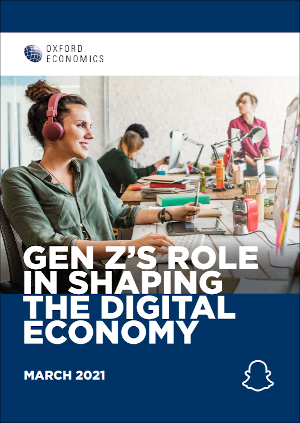Recent Release | 10 Mar 2021
Gen Z’s role in shaping the digital economy

Economic Consulting Team
Oxford Economics

A new report by Oxford Economics for Snap Inc. shows how members of Generation Z are poised to play a major role in the economy and labour market over the coming decade across six leading markets: Australia, France, Germany, the Netherlands, the UK, and the US.
While the outbreak of the coronavirus pandemic and the deep global recession triggered by measures to contain its spread have impacted younger workers, the accelerated shift towards a more digital economy will serve to the long-term advantage of Gen Z.
Gen Z’s income from work will balloon from $440 billion to more than $3.5 trillion by 2030. We estimate their total consumer spending will be $3.0 trillion – equivalent to 11% of total household spending across the six economies.
We developed a digital competence index measure. Pooling responses across our survey, Gen Z’s average competence score was 2.5% higher than Millennials and over 8% higher than Gen X. Beyond digital aptitude, our research has highlighted three Gen Z traits that we think are likely to serve them well in the future workplace:
- Agility: the ability to absorb information and reacting to new challenges as they occur
- Creativity: knowing how to create and design various types of digital content
- Curiosity: being more likely to engage in various forms of informal learning
Our economic consulting team are world leaders in quantitative economic analysis, working with clients around the globe and across sectors to build models, forecast markets and evaluate interventions using state-of-the art techniques. Lead consultant on this project was:
Oxford Economics’ team is expert at applying advanced economic tools that provide valuable insights into today’s most pressing business, financial, and policy issues.
To find out more about our capabilities, contact:
EMEA
Sam Moore
+44 (0)207 803 1415
Email
Americas
Hamilton Galloway
+1 (646) 503 3068
Email
Asia
Rhianne Clark
+65 6850 0112
Email
Related Services

Post
The economic impact of abandoning the WTO
Oxford Economics have been commissioned by the International Chamber of Commerce (ICC) to provide an independent assessment of the economic impact of WTO dissolution. This report details our findings and the assumptions underpinning our analysis.
Find Out More
Post
The economic impact of the sports activities of public service media
This study shows how the sports activities of public service media supported €4.5 billion of GDP and 57,000 jobs across 31 European countries in 2022. The report also highlights wider economic benefits of public service media sports coverage, such as the way in which it leverages sponsorship income for sports bodies.
Find Out More
Post
Global Trade Education: The role of private philanthropy
Global trade can amplify economic development and poverty alleviation. Capable leaders are required to put in place enabling conditions for trade, but currently these skills are underprovided in developing countries. For philanthropists, investing in trade leadership talent through graduate-level scholarships is an opportunity to make meaningful contributions that can multiply and sustain global economic development.
Find Out More